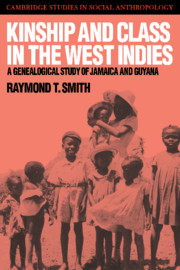Book contents
- Frontmatter
- Contents
- Preface
- Maps
- 1 Introduction: assumptions, procedures, methods
- 2 Kinship, culture and theory
- 3 What is kinship in the West Indies?
- 4 The structure of genealogies
- 5 Marriage in the formation of west Indian society
- 6 Modern marriage and other arrangements
- 7 Sex role differentiation
- 8 Household and family
- 9 Conclusion
- References
- Index
- Cambridge Studies in Social Anthropology
1 - Introduction: assumptions, procedures, methods
Published online by Cambridge University Press: 29 October 2009
- Frontmatter
- Contents
- Preface
- Maps
- 1 Introduction: assumptions, procedures, methods
- 2 Kinship, culture and theory
- 3 What is kinship in the West Indies?
- 4 The structure of genealogies
- 5 Marriage in the formation of west Indian society
- 6 Modern marriage and other arrangements
- 7 Sex role differentiation
- 8 Household and family
- 9 Conclusion
- References
- Index
- Cambridge Studies in Social Anthropology
Summary
If there is one point I have consistently tried to make throughout this book, it is that psychology, anthropology, and the social sciences in general, have repeatedly falsified their ‘observations’ by unrecognized epistemological and ideological closures imposed upon the system under study.
Anthony Wilden 1972West Indian family life has always interested social scientists, but few have understood it. Like other aspects of Caribbean ethnography, it is difficult to grasp in terms of accepted social theory, and because of this the study of West Indian kinship assumes a wider significance. Even in the eighteenth century West Indians discussed the peculiarities of their kinship arrangements. One Jamaican-born writer published, in 1793, in German, an essay on ‘The Nair system of gallantry and inheritance,’ subsequently expanded into a romantic novel preoccupied with love and marriage (or the absence of it), entitled Das Paradies der Liebe. The author, James Henry Lawrence, used the Nayar of Malabar as the model on which to construct a utopian system of perfect equality of the sexes, in which children would be affiliated only to their mothers (Lawrence 1976 [1811]). Eighteenth-century West Indians were prolific writers, and they rightly felt themselves to be an integral part of the modern world in which egalitarian ideas were increasingly common, but one wonders how much of Lawrence's inspiration came from his Jamaican background. The Caribbean has its own history, with social and cultural systems that must be studied in their own right.
- Type
- Chapter
- Information
- Kinship and Class in the West IndiesA Genealogical Study of Jamaica and Guyana, pp. 1 - 20Publisher: Cambridge University PressPrint publication year: 1988



